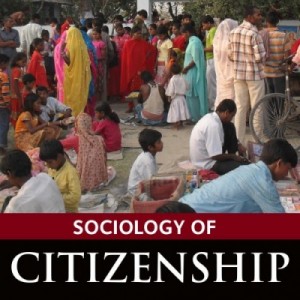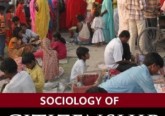 Social scientists most commonly view citizenship as a juridical status conferred by states upon individuals in a national community. T.H. Marshall’s (1950) formulation most famously helped analysts to unpack its political, civil and social dimensions.
Social scientists most commonly view citizenship as a juridical status conferred by states upon individuals in a national community. T.H. Marshall’s (1950) formulation most famously helped analysts to unpack its political, civil and social dimensions.
Marshall’s formulation has since been held up to critical scrutiny for the manner in which it foregrounded citizenship as a regime of rights. In her critique of Marshall’s account, Margaret Somners (1993: 589) reminds us that citizenship refers to an ensemble of “institutionally-embedded social practices”. The idea of citizenship as practice and process has since been emphasized by many a political theorist (Beetham, 1999; Heater, 1999; Mouffe, 1996). Such perspectives have made possible further sociological investigations into citizenship. What does citizenship actually mean to the people upon whom it is conferred as a legal status? With what meanings do people who claim it, either through petition or through struggle, imbue it? The viewpoint that citizenship is an ensemble of practices enables scholars to investigate the concrete ways in which states fashion citizens (Ong, 1999) as well as the ways in which people forge their collective selves as citizens (Lazar and Nuitjen, 2013).
In examining the latter, scholars remain divided about the centrality of the state. Some scholars retain the idea that the liberal democratic welfare state, with its focus on equal citizenship, provides the fullest expression of citizenship that encompasses all, especially the vast majority of the world’s population who struggle on an everyday basis to secure their livelihoods. These scholars explore the ways in which people draw on the vocabulary of the state to substantiate their own claims of citizenship (Gaventa, 2002; Holston, 2008; Jayal, 2013).
Against this liberal normativity, other scholars have suggested that analysts redefine citizenship to more accurately reflect popular notions of membership in the political community. In this vein, James Ferguson asks analysts to consider the claims of the world’s impoverished for whom citizenship is about “being a rightful and deserving dependent of the state” (Ferguson, 2013: 237). Likewise, Partha Chatterjee directs attention to the exemptions that impoverished people request from their governments while securing their livelihoods to suggest that analysis of political practices be framed “as a redefined norm that endorses differentiated rather than equal citizenship as the normative standard for the modern state” (Chatterjee, 2012: 24).
Yet other scholars have called for a reconceptualisation of citizenship beyond the state altogether. Gordon and Stack (2007) have emphasized citizenship as providing “room to maneuver” for people to secure their livelihoods, while Robins, et al (2008) highlight the need to think about citizenship in terms of political agency, embedded in everyday life. Lazar (2008) invokes the conception of the citizen in terms of “the neighbour”. Trevor Stack (2012) suggests that citizenship should be analysed in terms of people’s aspirations to live in society, in a civil way. His interlocutors from western Mexico explicitly remarked that citizenship had more to do with obligations that arose out of living in society – a “civil sociality” as it were – rather than being solely about a relationship with the law codified by the state. In a different vein, Jaoul and Shah (forthcoming) explore the ambivalences around the ways in which citizenship practices relate to emancipatory politics. They call attention to the ways in which popular political practices intersect and exceed citizenship.
What is at stake here? Can we in fact talk about citizenship independent of and beyond the state? If the attribute being analysed exists independently of and beyond the state, is it appropriate to subsume it under the rubric of citizenship? Conversely, can any political relationship between people and their states be analysed as citizenship? Is citizenship an appropriate analytic to describe political relationships unrelated to the conceptions of individual rights, payment of taxes or the guarantee of safeguarding private property? In such circumstances, then, instead of widening the analytic net of citizenship to the point of “stretching” the concept too far, might it be more appropriate to think of citizenship as one of several ways of forging membership in the political community? Or, perhaps, there remains analytical purchase in the concept of citizenship that needs to be fleshed out in the context of ongoing popular struggles throughout the world?
These are some of the issues to which the authors in our new blog series, The Sociology of Citizenship, will direct their attention. They will examine the theme of citizenship in terms of people’s actual practices so as to enable readers to understand the dynamic ways in which it is interpreted by people in different parts of the world. Most of our authors will draw on fieldwork to tease out the ambivalences and contradictions that mark people’s political practices and situate these against formal discourses and narratives of citizenship. A few among them will introduce their forthcoming publications while others will review recent books that deal with this subject. Their methodological approaches and analytical standpoints will vary, but what binds them together is an inductive approach through which they will elucidate the sociology of citizenship.
BIBLIOGRAPHY
Beetham, D. (1999) Democracy: A beginner’s guide. Oxford: Oneworld Publishers.
Chatterjee, P. (2012) Lineages of Political Society. Ranikhet: Permanent Black.
Ferguson, J. (2013) Declarations of dependence: Labour, personhood and welfare in southern Africa, Journal of the Royal Anthropological Institute, 19 (2): 223-42.
Gaventa, J. (2002) Exploring citizenship, participation and accountability, IDS Bulletin 33 (2): 1-14.
Gordon, A. and T. Stack (2007) Citizenship beyond the state: Thinking with early modern citizenship in the contemporary world, Citizenship Studies 11 (2): 117-33.
Heater, D. (1999) What is citizenship? Cambridge: Polity Press.
Holston, J. (2008) Insurgent citizenship: Disjunctions of democracy and modernity in Brazil. Princeton: Princeton University Press.
Jaoul, N., and A. Shah (forthcoming) Beyond citizenship: The arcadian spaces of emancipation, FOCAAL: Journal of Global and Historical Anthropology.
Jayal, N.G. (2013) Citizenship and its discontents: An Indian history. Harvard: Harvard University Press.
Lazar, S. (2008) El Alto, rebel city: Self and citizenship in Andean Bolivia. Durham: Duke University Press.
Lazar, S. and M. Nuitjen (2013) Citizenship, the self and political agency. Critique of Anthropology 33 (1) 3-8.
Marshall, TH (1950) Citizenship and social class and other essays. Cambridge: Cambridge University Press.
Mouffe, C. (1996) “Democratic citizenship and the political community”. In C. Mouffe (ed.) Dimensions of Radical Democracy: Pluralism, Citizenship, Community. London: Verso.
Ong, A. (1999) Flexible citizenship: The cultural logics of transnationality. Durham: Duke University Press.
Robins, S., A. Cornwall and B. von Lieres (2008) Rethinking ‘citizenship’ in the postcolony, Third World Quarterly 1069-86.
Somners, M. (1993) Citizenship and the place of the public sphere: Law, community and political culture in the transition to democracy, American Sociological Review 58 (5): 587-620.
Stack, T. (2012) Knowing history in Mexico: An ethnography of citizenship. Alberquerque: University of New Mexico Press.
Dr Indrajit Roy is an ESRC Research Fellow at the Oxford Department of International Development, University of Oxford.





No Comment